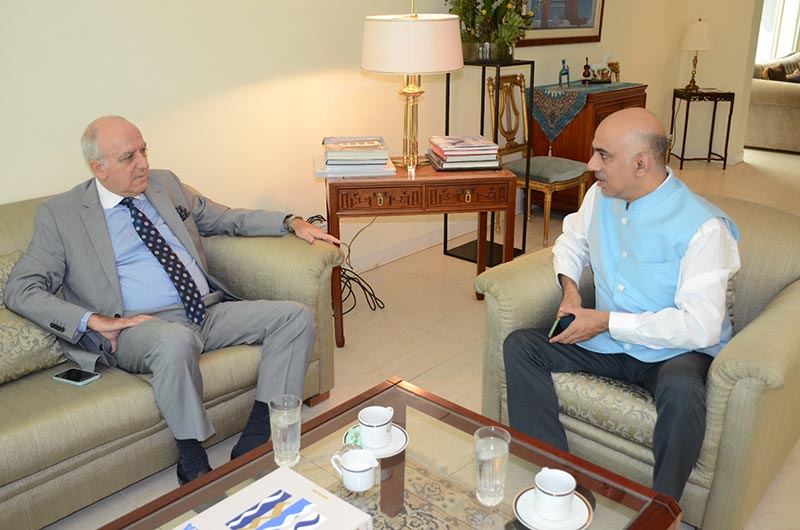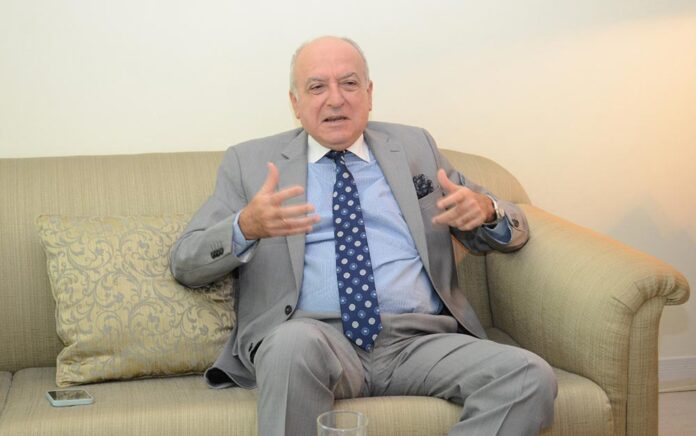Kuwait is an unparalleled paradise
for diplomats, says outgoing Greek envoy
By Reaven DSouza
Managing Editor
Ambassador of Greece to Kuwait and Bahrain, H.E. Constantinos Piperigos has completed his tenure in Kuwait and is leaving to take up his next posting as Director-General of the Economic and Administrative Affairs Department at the Greek Foreign Ministry in Athens. Amid his busy schedule of taking leave of officials and friends in Kuwait, Ambassador Piperigos spared some time to speak at length to the Managing Editor of The Times Kuwait, Reaven D’souza, about his experiences living and working in Kuwait.
He began by saying, “I arrived in Kuwait with my wife on a Saturday evening in 2019 after a long trip, and I was received by one of the officers of the Protocol Department at the Kuwait Foreign Ministry, who said, ‘Welcome to your second home-country.’ I did not grasp the meaning of what he said at the time, but within only three months I understood what he had meant by that welcoming sentence after having witnessed the kindness and generosity, and experienced the wonderful hospitality and openness shown by the Kuwaiti people. This is what distinguishes Kuwait, as it is a paradise for diplomats.”
He added that when he visited the Failaka Island for the first time, he prostrated on the ground and kissed its soil because of his feeling of greatness that after 2,300 years, he would stand on the same ground where Alexander the Great and his soldiers had set their feet on. They were moments and feelings that were difficult for him to describe.
 He went on to say, “I spent a wonderful time in Kuwait, and I held many events to bring the peoples of the two countries closer together, the most recent of which was the Alexander the Great Exhibition in the Contemporary Art Platform, which was originally scheduled for a month in Kuwait, but was extended to over three months because of the passion of researchers and those interested in this great exhibition, and also because of the discussions it ignited to work on transforming Failaka into a cultural and tourist destination.”
He went on to say, “I spent a wonderful time in Kuwait, and I held many events to bring the peoples of the two countries closer together, the most recent of which was the Alexander the Great Exhibition in the Contemporary Art Platform, which was originally scheduled for a month in Kuwait, but was extended to over three months because of the passion of researchers and those interested in this great exhibition, and also because of the discussions it ignited to work on transforming Failaka into a cultural and tourist destination.”
Pointing out that he succeeded in bringing the two countries together at the people-to-people and commercial levels as well, he noted that direct flights between the two countries were launched last year and expanded this year — with now two flights per week to Athens throughout the year and five during the summer to Athens and Mykonos. He stated that the Greek embassy issued about 5,000 visas during the current year, most of them for long-term, multi-entry visas, including 3,500 visas during the summer.
The Greek envoy explained that Kuwaiti investments were not as significant in his country in the past, but after direct airline connections, as well as stability and economic growth in Greece, major Kuwaiti investors are grasping the momentum and have been examining prospects and showing high interest for investment opportunities in various fields, including in real estate, renewable energy and tourism amongst others.
Noting that the Greek ‘golden visa’ system granting residency is considered the most affordable in Europe, he explained that it costs 250,000 Euros in all regions of Greece, except for 4 specific regions – parts of Athens, Thessaloniki, Mykonos, and Santorin, which cost about 500,000 Euros. The ambassador stated that Greece is considered a safe country with a very low crime rate – although he admitted it is difficult to compete with Kuwaits safety.
The Greek ambassador explained that his country exports to Kuwait industrial equipment, building materials, metals, pharmaceuticals, cosmetics, vegetables, fruits, dairy products, and the famous greek olive oil. He also mentioned that the Greek company DESFA assures the maintenance and operation of the gas deposits of Al-Zour refinery, and that major Greek constructing companies are interested in returning again to the Kuwaiti market.
We have a small community in Kuwait of about 200 people, most of whom work in universities, schools and banks, and the most important challenges they face, like other communities, are obtaining a driver’s license and bringing their families to Kuwait. He elaborated on this by saying that there are discussions at the European Union level to find a solution to these challenges.
He added that the next step after the adoption of the European Cascade visa system for Kuwaitis is the visa waiver, and that the visit to Kuwait by the European envoy to the Gulf region last Friday addressed these challenges facing the Europeans in Kuwait.
The Greek Foreign Minister will also attend the meeting of the 27th session of the Joint Ministerial Council of the Gulf Cooperation Council states and the European Union due for 9 and 10 October in Muscat, and has requested a bilateral meeting with the Kuwaiti Foreign Minister Sheikh Salem Al-Sabah and he plans to invite him to visit Athens.
The ambassador said he expected to see more Kuwaiti students in Greek universities since many Universities provide English-speaking departments and also because of the presence of the most prestigious universities there, especially for medical specialties. He also pointed out that there are a number of Kuwaiti students studying aviation in Greece.
Revealing that the next ambassador of Greece to Kuwait is H.E. Yianni Plotas, the outgoing Greek envoy added, “I met Plotas many years ago, he is a wonderful person and is expected to arrive in Kuwait from Nigeria, along with his wife and their two pet dogs, very soon.”

















